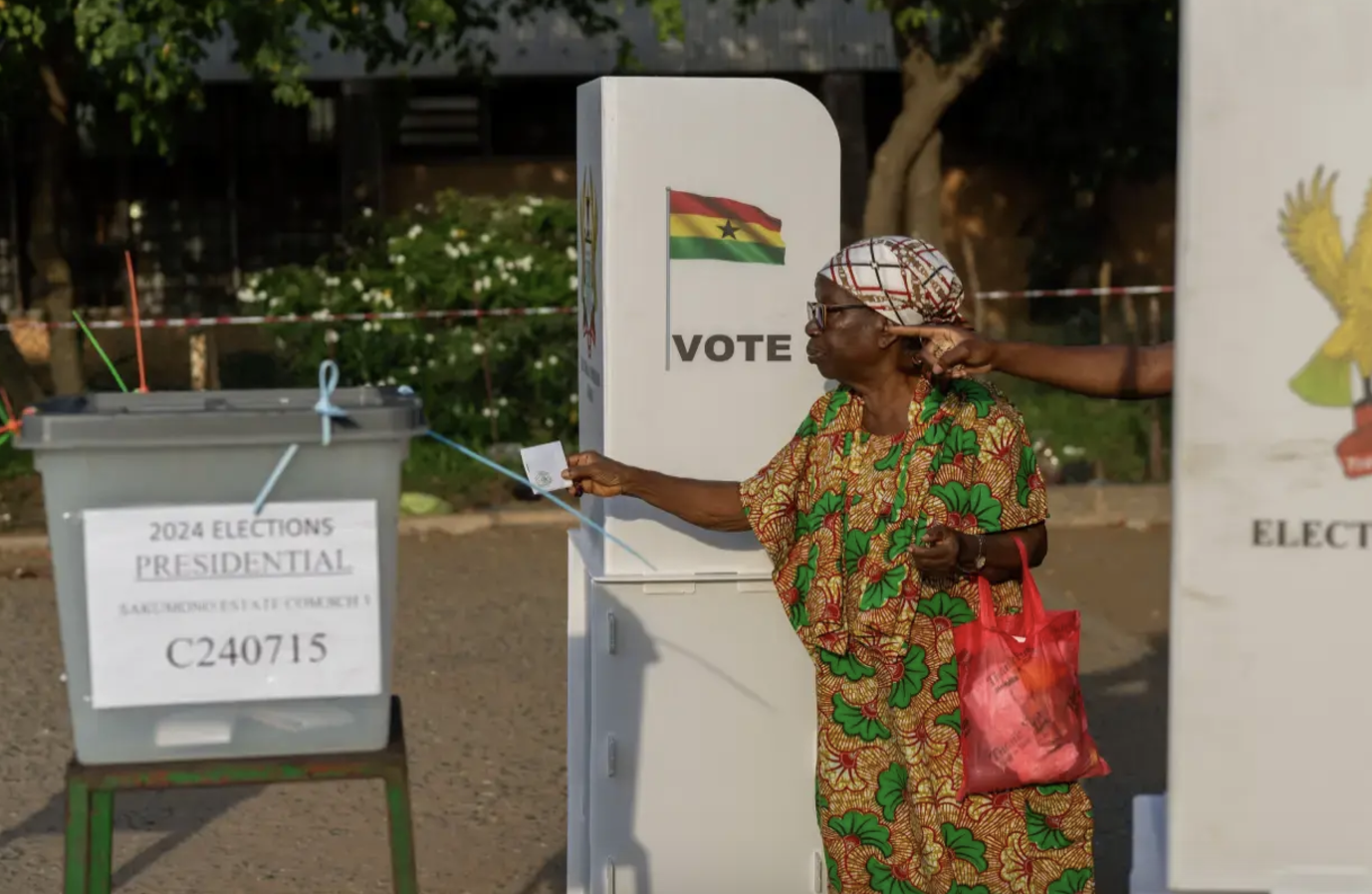News
Understanding a Nation’s Pulse — Are Ghana’s Leaders Ready, as the Country Votes?
Ghana stands at a crossroads. Recent protests and citizen frustrations reveal what can happen when leaders underestimate the power of a disillusioned populace. An Afrobarometer survey paints a stark picture of citizen priorities.

As Ghana hurtles towards another crucial election, the findings of Afrobarometer’s Round 10 survey serve as a pressing call to action. These results are not just a snapshot of current concerns but a vital diagnostic tool for understanding a nation’s pulse. From the pressing issue of unemployment to the dire need for improved infrastructure and accessible healthcare, the survey paints a stark picture of citizen priorities, underscoring the urgent need for political leaders to act.
According to the Afrobarometer’s Round 10 survey, 41% of Ghanaians identified unemployment as their top concern, followed by infrastructure (38%) and health (33%). This marks a consistent trend over the years, with job creation topping the list since 2008. Ghanaians are saying loud and clear: they want jobs, better roads, and accessible healthcare. The more interesting question, however, is whether these concerns will be met with substantive action by winners of the upcoming election, or whether the broad claims to address these issues in party manifestos will once again reduce politics to hollow promises. However, beneath these headline figures lies a nuanced story.
Unemployment, while often framed as an economic metric, has deeper social dimensions that extend beyond mere job statistics. Scholars such as Amartya Sen emphasise that unemployment erodes individual agency, depriving people of the means to participate fully in their communities. For young Ghanaians, joblessness exacerbates social inequality and fosters a sense of exclusion, further destabilising an already strained social fabric.
The Afrobarometer findings underscore this reality, as many people navigating a challenging job market face not only economic barriers but also the psychological toll of limited opportunities. The high cost of living in the country compounds these struggles, as inflation and stagnant wages stretch household resources thin, forcing families to make difficult trade-offs. It is no surprise that scores of migrants increasingly find illegal artisanal mining worth the trouble or, worse, explore the extremely risky travails across the Sahara and the Mediterranean seas to “better” (read better-paying, not dignified per se) opportunities in Europe. These dynamics highlight the interconnectedness of economic management and social cohesion, illustrating why unemployment and cost-of-living concerns remain so deeply felt across Ghanaian society and require urgent, intentional resolve.
Interestingly, too, while infrastructure consistently ranks high on the list, citizens’ focus on specific areas — like roads — suggests an expectation for visible, impactful projects that citizens interact with on a daily basis. Access to reliable roads impacts everything, from commuting to transporting goods and accessing healthcare. It makes one wonder whether the visible rush to complete the massive and long-awaited Flowerpot Interchange is in response to this need. Maybe, maybe not. A win is a win.
Practical tools to improve daily realities
Citizens focus, however, on localised and functional projects signals a shift in expectations from previous times. Citizens no longer view infrastructure as abstract national achievements but as practical tools that should improve daily realities. For political leaders, this presents an opportunity and a challenge: to deliver results that are not only symbolic but also meaningful at a community level. The question remains whether Ghana’s political class can recalibrate their approach from lofty campaign promises to policies that deliver tangible outcomes that resonate with voters (and do not unnecessarily indebt future generations).
Another striking finding — though not entirely surprising — is the overwhelming sense that Ghana is heading in the wrong direction economically. Only 36% of respondents believed the country is on the right track, and fewer than half (45%) expect the economy to improve within the next year. These perceptions are not mere pessimism; they reflect lived realities, with 82% of Ghanaians experiencing lived poverty — challenges in accessing basic necessities such as cash income, food and medical care. It goes without saying that a gap exists between citizens’ expectations and their living conditions. In Ghana, this disparity underscores a disconnect between macroeconomic indicators touted by policymakers and the on-the-ground struggles of everyday citizens.
This erosion of optimism has profound implications for public trust in government institutions and political leaders. Scholars like Francis Fukuyama have long argued that trust is a foundational element of functioning democracies. When trust erodes due to perceived government ineffectiveness or unfulfilled promises, the result is often a vicious cycle of disengagement and reduced accountability. Ghana is at risk of this cycle: a disillusioned electorate may abstain from voting or participating in civic activities, weakening the social contract that binds leaders and the governed. Clearly, the challenge for Ghana’s democracy — and what is at stake in these December 7 elections — is not just about restoring economic confidence but about rebuilding this critical trust. Without it, even well-intentioned policies will likely face resistance or apathy from the very citizens they are designed to help.
The gap
The gap between citizen priorities and government action further compounds this trust deficit. While respondents overwhelmingly supported continuing initiatives like Free Senior High School (85%) and agricultural programs (81%), there was strong opposition to the electronic transactions levy (79%). This selective endorsement highlights a critical insight: policies must not only be well-meaning but also resonate with the everyday realities of citizens. E-levy, for instance, may be viewed as disproportionately burdensome on those already struggling with cash flow, which explains its unpopularity. Ghana’s leaders would do well to heed these lessons as they craft policies for the future.
As the elections draw nearer, political parties have an opportunity — and an obligation — to bridge this gap. The Afrobarometer findings offer a roadmap: party manifestos must move beyond vague rhetoric to provide actionable, detailed plans. How will they create sustainable jobs, particularly for young people who comprise a significant portion of the electorate? What strategies will be employed to improve infrastructure in ways that visibly enhance citizens’ daily lives? And perhaps most critically, how will parties ensure that economic stability translates into tangible benefits for all, not just a privileged few?
Pivotal role of young voters
Disproportionately affected by unemployment and economic instability, young voters will play a pivotal role in the upcoming election. As Albert Hirschman’s “Exit, Voice, and Loyalty” framework suggests, marginalised groups often resort to either “exit” (disengagement) or “voice” (active participation) when dissatisfied. This election represents an opportunity for political actors to channel youth frustrations into meaningful engagement — leaders who ignore this demographic risk alienating a generation critical to Ghana’s future economic and political stability. Recent events in Ghana — demonstrations, street protests and social media lambasting — are an insight into how these frustrations have played out so far. Their voices should not only be heard but reflected in the next government’s policies.
Ghana’s future?
Beyond the immediate concerns, the survey raises broader questions about the direction of Ghanaian society and presents a stark choice for Ghana’s political leaders. Are the current political structures equipped to address the complex, intersecting challenges of unemployment, infrastructure, and healthcare? Or do they need to reform to meet citizens’ needs better? Will they continue the cycle of lofty promises and unfulfilled expectations, or will they take bold steps to rebuild trust, address citizen priorities, and offer concrete solutions? The stakes could not be higher — not just for this election, but for the future trajectory of Ghanaian democracy.
Furthermore, how do these findings shape Ghana’s place on the continent and the global stage? With African economies increasingly interconnected, the ability of Ghana’s leaders to address these burning issues could serve as a model — or a cautionary tale — for other nations. In a politically tumultuous region, and with much uncertainty about global leadership, good political outcomes will go a long way toward maintaining faith in existing governance models.
Translating findings into action
Perhaps the most profound question is this: What does it mean to truly listen to citizens? The Afrobarometer survey is a powerful starting point, providing a clear articulation of the public’s concerns. But, translating these findings into action requires more than cosmetic policy adjustments. It demands a transformative shift in the governance culture — one that prioritizes responsiveness over rhetoric.

Leaders must reframe citizen feedback not as criticism to be dismissed or downplayed but as a valuable guide for crafting meaningful and sustainable solutions. This approach requires humility, transparency, and a willingness to embrace participatory governance, where citizens are not just passive recipients of policy but active contributors to its design and implementation. This is where Ghana’s democracy can find renewal — not in grandiose promises, but in consistent, people-centered governance that visibly improves lives.
An equally pressing question, though harder to confront, is whether Ghana’s democratic gains can withstand the current economic and social pressures. While Afrobarometer findings show a continued appreciation for democratic principles, there is a noticeable erosion of faith in democracy’s ability to deliver tangible benefits. It is known widely, as recently evidence in many parts of West Africa, that dissatisfaction with democratic outcomes can pave the way for authoritarian tendencies or apathy. Ghana’s way forward is clear: to evolve its democracy into one that marries procedural success — such as peaceful elections — with substantive outcomes like improved livelihoods and greater equity. The sentiments of Ghanaians clearly laid out here are a wake-up call to prevent Ghanaian democracy from stagnating into a hollow shell, where the mechanics of voting mask a failure to deliver real change.
For political leaders, the mandate is unambiguous: align your policies with the people’s priorities and follow through on them. Do them. Move beyond platitudes and promises and instead deliver concrete, actionable solutions that resonate with citizens’ lived experiences. For voters, especially the youth, this election is not just another ballot; it is a moment to demand better — better representation, better policies and better outcomes.
Ghana stands at a crossroads. Recent protests and citizen frustrations reveal what can happen when leaders underestimate the power of a disillusioned populace. Youth, in particular, are no longer content to “go away” after raising their concerns. Ignoring their demands for accountability, opportunity, and equity is not just unwise — it is unsustainable. The nation’s leaders have a rare opportunity to rebuild trust, address entrenched challenges and inspire hope for a better future. What leaders do — or fail to do — in this critical moment will shape not just the outcome of the upcoming elections but the trajectory of Ghana’s democracy for decades to come.
Why might that be? Democracy is more than an electoral event; it is a continuous process of listening, responding and delivering. As Ghanaians cast their votes, the ultimate question lingers: Are the country’s leaders genuinely ready to meet the moment, or will they let it slip away? And just as crucially, will citizens hold them accountable if they fail? The answers will define the nation’s future.
This article originally appeared on the Daily Maverick


